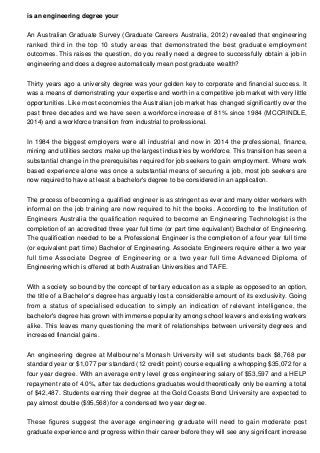
Is an engineering degree your golden ticket to financial gains?
- 1. is an engineering degree your An Australian Graduate Survey (Graduate Careers Australia, 2012) revealed that engineering ranked third in the top 10 study areas that demonstrated the best graduate employment outcomes. This raises the question, do you really need a degree to successfully obtain a job in engineering and does a degree automatically mean post graduate wealth? Thirty years ago a university degree was your golden key to corporate and financial success. It was a means of demonstrating your expertise and worth in a competitive job market with very little opportunities. Like most economies the Australian job market has changed significantly over the past three decades and we have seen a workforce increase of 81% since 1984 (MCCRINDLE, 2014) and a workforce transition from industrial to professional. In 1984 the biggest employers were all industrial and now in 2014 the professional, finance, mining and utilities sectors make up the largest industries by workforce. This transition has seen a substantial change in the prerequisites required for job seekers to gain employment. Where work based experience alone was once a substantial means of securing a job, most job seekers are now required to have at least a bachelor's degree to be considered in an application. The process of becoming a qualified engineer is as stringent as ever and many older workers with informal on the job training are now required to hit the books. According to the Institution of Engineers Australia the qualification required to become an Engineering Technologist is the completion of an accredited three year full time (or part time equivalent) Bachelor of Engineering. The qualification needed to be a Professional Engineer is the completion of a four year full time (or equivalent part time) Bachelor of Engineering. Associate Engineers require either a two year full time Associate Degree of Engineering or a two year full time Advanced Diploma of Engineering which is offered at both Australian Universities and TAFE. With a society so bound by the concept of tertiary education as a staple as opposed to an option, the title of a Bachelor's degree has arguably lost a considerable amount of its exclusivity. Going from a status of specialised education to simply an indication of relevant intelligence, the bachelor's degree has grown with immense popularity among school leavers and existing workers alike. This leaves many questioning the merit of relationships between university degrees and increased financial gains. An engineering degree at Melbourne's Monash University will set students back $8,768 per standard year or $1,077 per standard (12 credit point) course equalling a whopping $35,072 for a four year degree. With an average entry level gross engineering salary of $53,597 and a HELP repayment rate of 4.0%, after tax deductions graduates would theoretically only be earning a total of $42,487. Students earning their degree at the Gold Coasts Bond University are expected to pay almost double ($95,568) for a condensed two year degree. These figures suggest the average engineering graduate will need to gain moderate post graduate experience and progress within their career before they will see any significant increase
- 2. in their financial gains, much like any other degree. Based upon our findings the relationship between an engineering degree and increase financial gains appears to be more long term than short term. According to Ibis World statistics industry performance is predicated to deteriorate in the coming years due to lack of investment into mineral and energy developments and weaker conditions in the transport infrastructure market. Despite this, engineering consultancy firms are set to benefit from the resurgence of investment into commercial and industrial building markets with government sectors outsourcing engineering services. With the engineering industry forecast looking gloom university applications for engineering degrees are also slowing down. According to research by The Institute of Engineers Australia (IEAUS, 2013) in 2012, there were 18,224 applications for engineering degrees from year 12 students which was a 6.2 per cent increase from 2011 and a further 51.2 per cent increase from 2010. The 2013 study results revealed that applications for engineering degrees had only increased by a mere 292 (or 1.6 per cent) since 2012. This indicates that the market decline has reduced the large numbers of additional interest from prospective students that we have seen in previous years. These figures represent the ongoing effects of the transitioning job market and industry decline. While we have demonstrated that workers require a degree qualification before they can work as a professional engineer there are many roles in engineering consultancy that are experienced based rather than qualification based such as cost estimating. So the question now is, would allowing workers to complete ‘on the job' training as opposed to completing a degree, increase the engineering job market? Find out more about engineering at http://www.phoenixestimating.com.au/